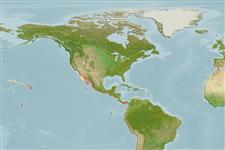Teleostei (teleosts) >
Anguilliformes (Eels and morays) >
Muraenidae (Moray eels) > Muraeninae
Etymology: Gymnothorax: Greek, gymnos = naked + Greek, thorax, -akos = breast (Ref. 45335).
More on authors: Jordan & Gilbert.
Environment: milieu / climate zone / depth range / distribution range
Ecology
Marine; reef-associated; depth range 3 - 36 m (Ref. 5227). Tropical; 32°N - 2°N
Eastern Pacific: Gulf of California to Ecuador, including the Galapagos Islands.
Size / Weight / Age
Maturity: Lm ? range ? - ? cm
Max length : 150 cm TL male/unsexed; (Ref. 9324)
Lives in rocky, boulder strewn areas and walls. Lurks in holes, crevices and dark recesses during day; forage in the open at night. Constantly opens and closes its mouth--an action required for respiration, not a threat (Ref. 5227). May occasionally wander into open sandy areas about 10-20 m from cover. Feeds mainly on crustaceans and fishes and are highly responsive to stimuli emanating from wounded or distressed prey at distances exceeding 20 m (Ref. 28023).
Life cycle and mating behavior
Maturities | Reproduction | Spawnings | Egg(s) | Fecundities | Larvae
McCosker, J.E. and R.H. Rosenblatt, 1995. Muraenidae. Morenas. p. 1303-1315. In W. Fischer, F. Krupp, W. Schneider, C. Sommer, K.E. Carpenter and V. Niem (eds.) Guia FAO para Identification de Especies para lo Fines de la Pesca. Pacifico Centro-Oriental. 3 Vols. FAO, Rome. (Ref. 9324)
IUCN Red List Status (Ref. 130435)
Threat to humans
Harmless
Human uses
Fisheries: minor commercial
Tools
Special reports
Download XML
Internet sources
Estimates based on models
Preferred temperature (Ref.
123201): 20.7 - 28.5, mean 25.8 °C (based on 34 cells).
Phylogenetic diversity index (Ref.
82804): PD
50 = 0.5000 [Uniqueness, from 0.5 = low to 2.0 = high].
Bayesian length-weight: a=0.00047 (0.00025 - 0.00089), b=3.28 (3.13 - 3.43), in cm total length, based on LWR estimates for this Genus-body shape (Ref.
93245).
Trophic level (Ref.
69278): 4.0 ±0.67 se; based on food items.
Resilience (Ref.
120179): Very Low, minimum population doubling time more than 14 years (Preliminary K or Fecundity.).
Fishing Vulnerability (Ref.
59153): Very high vulnerability (90 of 100).
Nutrients (Ref.
124155): Calcium = 21.6 [11.2, 36.3] mg/100g; Iron = 0.386 [0.224, 0.876] mg/100g; Protein = 18.9 [16.6, 21.4] %; Omega3 = 0.0912 [, ] g/100g; Selenium = 48.6 [25.3, 96.2] μg/100g; VitaminA = 48.7 [13.4, 165.1] μg/100g; Zinc = 0.84 [0.59, 1.18] mg/100g (wet weight);
